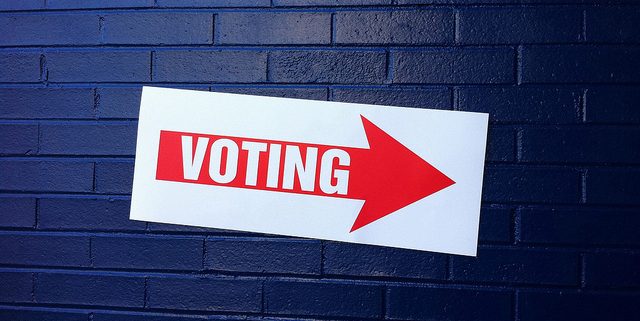Are Employers Required To Provide Time Off To Vote?
The U.S. Presidential Election is heating up–honestly, it’s a firestorm already. Tuesday, November 8, 2016 is the culmination of 18 months of primary and general election campaigning. And as with every election, the candidates, political parties, and special interest groups will all be pushing for strong voter turnout as that date nears.
Free, fair, and regular elections are essential for a democracy. To the extent that citizens exercise their right to vote, our democracy will come closer to the ideal of a government governing with the consent of the governed. So while, as a nation of citizens, we will never unanimously agree on who should be elected to government, it’s imperative that barriers to voting be removed wherever possible.
Employers are in a unique position to facilitate voting by their employees. Although polls are open a few hours before and after typical work hours, it’s not always easy for people to make it to the polls. Long commutes, childcare, and “the unexpected” can all become obstacles to voting before and after work. By providing employees with time off to vote during the work day, employers can expand options for employees and build a stronger work culture.
Employer Law On Voting Leave, A Mixed Bag
Currently, there are no federal laws requiring employers to provide time off to vote. However, the majority of states do have laws around employee voting leave. As you can imagine, these laws vary greatly. Here are examples of how state laws can differ:
States Where Employers Are Required To Provide Time Off
- Some must provide paid time off, but not all
- Some specify the amount of hours an employer must provide
- Some require employees to prove an inability to vote outside work hours
- Some require employees to give notice to employer
- Some require employees to provide evidence that they did in fact vote
- Some punish non-compliant employers and/or supervisors with fines
- All prohibit employers from disciplining, rewarding, or terminating an employee for voting or not voting or for voting a particular way
States Where Employers Are Not Required To Provide Time Off
- No requirement to provide leave, but voting law prohibits discipline, reward, or termination of an employee for voting or not voting or voting a particular way
Obviously, if you’re an employer who is wrestling with whether or not to offer employees time off for voting, you’ll want to check on the voting laws specific to your state (here’s where you can do that). However! Legal requirements should be the first, but least of your considerations. Employers must also take into account the benefits–outside of avoiding legal fines–of offering voting leave, and the drawbacks–outside of lost productivity–of offering it.
Time Off To Vote?
As mentioned, the right to choose our leaders in free and fair elections is fundamental to our democracy, a right that millions across the world do not enjoy. To not exercise that right by choice is a personal prerogative, but to be hindered by an employer in exercising it–directly or indirectly–can be demotivating and stressful for an individual. “So what?” Says the indifferent, cynical employer.
Well, let’s compare a couple scenarios. Scenario A is what might happen when an employer fails to offer time off to employees for voting. Scenario B is what might happen when they do offer it, and perhaps even encourage it.
Scenario A
Your Employee’s Friend (did vote): Hey Becky, how’s it going? Did you rock the vote yesterday?
Your Employee (didn’t vote, but wanted to): Ehh no. I know I’m awful, Gina. But I was rushed this morning with the kids and I had to work late. Traffic was horrible. And they don’t let you off work to vote. I just couldn’t get away.
Your Employee’s Friend: Damn Becky. That’s crap that they don’t let you leave to vote.
Your Employee: I know, right? I’m going to go overshare about it on Facebook and in the comment section of the local newspaper…maybe Glassdoor if I have time.
Scenario B
Your Employee’s Friend (did vote): Hey Becky, how’s it going? Did you rock the vote yesterday?
Your Employee (left work for an hour to vote): Hell yeah I rocked it, Gina! We have a voting day party at work. They bring in American flag cupcakes and a cardboard cutout of Uncle Sam. We all leave to vote for an hour in shifts. At the end of the day we set off fireworks in the parking lot.
Your Employee’s Friend: Oh. My. God. Becky. Your voting turnout must be so big! What about employees who don’t want to vote or can’t? Can they participate?
Your Employee: Sure! They can use the time to do whatever they want. Our owner just asks that everyone sticks to the time limit.
Your Employee’s Friend: Your company is awesome! I wish my work was that cool…
Your Employee: Damn Gina! You know we are hiring in HR? You should apply for the job. You’d be a great fit!
Do The Right Thing
While I may have overdramatized the above scenarios–and indulged in one too many oblique references to the early 90’s–the outcomes are not far-fetched. Regardless of what state laws require, employers who proactively provide time off to vote and embrace it as an important part of company culture will strengthen their employer brand in two ways.
First, employee morale will increase thanks to the generous policy and creative celebration. Second, job seekers –especially those likely to be referred by current employees– will be attracted to a fun, unique work culture.
Too often, employers look at the the lost hours or productivity that may come with granting time off to vote. However, if they would take a step back and look at voting leave as an opportunity to bring employees together in a way that is so much bigger than work, then they could very well end up with increased productivity, along with a stronger employer brand.
Plus, in most cases, it’s the right thing to do.
Please note: The ExactHire team is not legal counsel, and we do not offer legal advice, so any questions regarding your company’s legal requirements to provide voting leave should be discussed with your company’s legal counsel.
Image credit: voting by JustinGrimes (contact)










 15% OFF FULL-SERVICE HIRING • APPLICANT TRACKING SOFTWARE • ONBOARDING SOFTWARE
15% OFF FULL-SERVICE HIRING • APPLICANT TRACKING SOFTWARE • ONBOARDING SOFTWARE